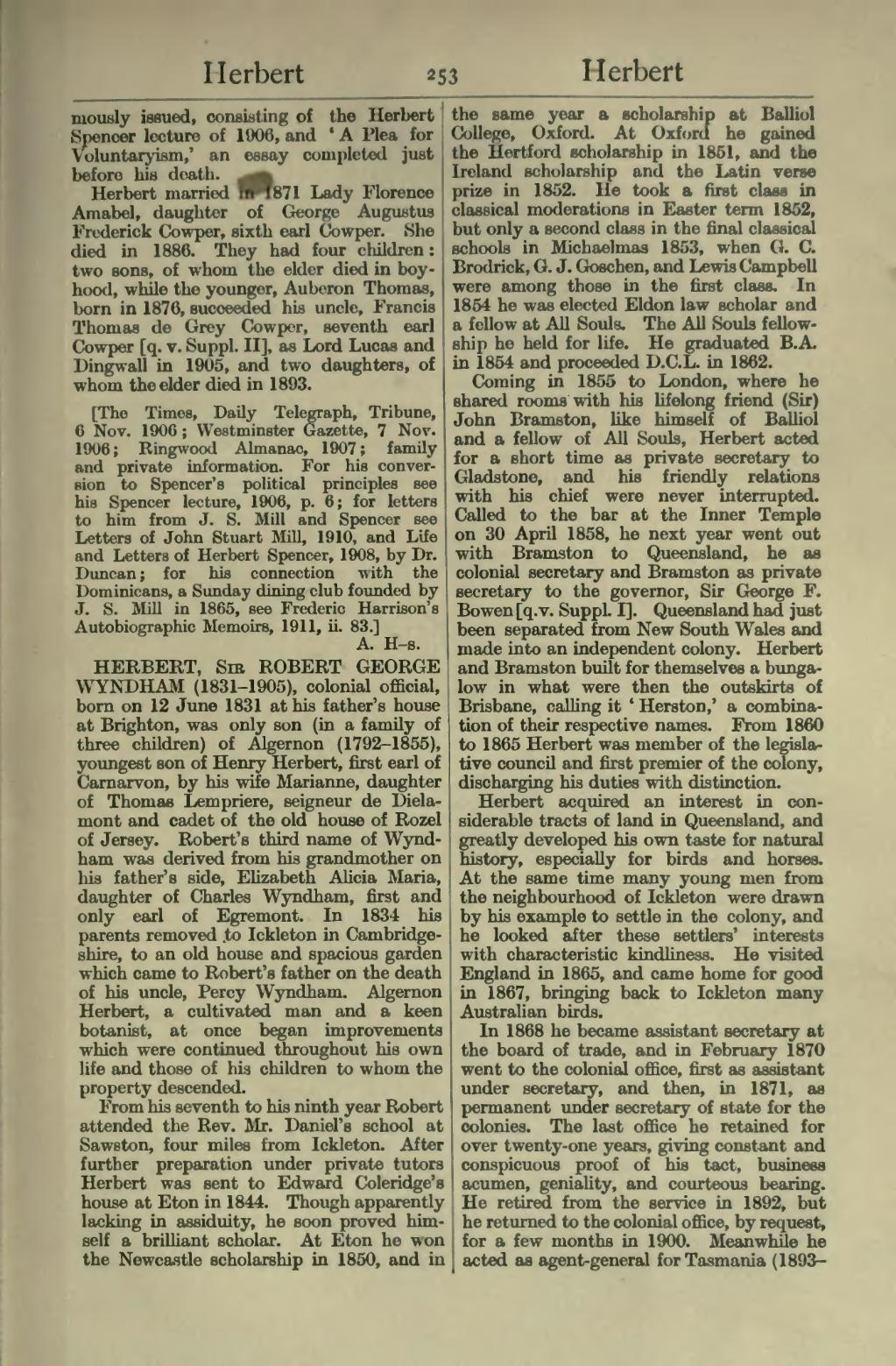mously issued, consisting of the Herbert Spencer lecture of 1906, and 'A Plea for Voluntaryism,' an essay completed just before his death.
Herbert married in 1871 Lady Florence Amabel, daughter of George Augustus Frederick Cowper, sixth earl Cowper. She died in 1886. They had four children: two sons, of whom the elder died in boyhood, while the younger, Auberon Thomas, born in 1876, succeeded his uncle, Francis Thomas de Grey Cowper, seventh earl Cowper [q. v. Suppl. II], as Lord Lucas and Dingwall in 1905, and two daughters, of whom the elder died in 1893.
[The Times, Daily Telegraph, Tribune, 6 Nov. 1906; Westminster Gazette, 7 Nov. 1906; Ringwood Almanac, 1907; family and private information. For his conversion to Spencer's political principles see his Spencer lecture, 1906, p. 6; for letters to him from J. S. Mill and Spencer see Letters of John Stuart Mill, 1910, and Life and Letters of Herbert Spencer, 1908, by Dr. Duncan; for his connection with the Dominicans, a Sunday dining club founded by J. S. Mill in 1865, see Frederic Harrison's Autobiographic Memoirs, 1911, ii. 83.]
HERBERT, Sir ROBERT GEORGE WYNDHAM (1831–1905), colonial official, born on 12 June 1831 at his father's house at Brighton, was only son (in a family of three children) of Algernon (1792–1855), youngest son of Henry Herbert, first earl of Carnarvon, by his wife Marianne, daughter of Thomas Lempriere, seigneur de Dielamont and cadet of the old house of Rozel of Jersey. Robert's third name of Wyndham was derived from his grandmother on his father's side, Elizabeth Alicia Maria, daughter of Charles Wyndham, first and only earl of Egremont. In 1834 his parents removed to Ickleton in Cambridgeshire, to an old house and spacious garden which came to Robert's father on the death of his uncle, Percy Wyndham. Algernon Herbert, a cultivated man and a keen botanist, at once began improvements which were continued throughout his own life and those of his children to whom the property descended.
From his seventh to his ninth year Robert attended the Rev. Mr. Daniel's school at Sawston, four miles from Ickleton. After further preparation under private tutors Herbert was sent to Edward Coleridge's house at Eton in 1844. Though apparently lacking in assiduity, he soon proved himself a brilliant scholar. At Eton he won the Newcastle scholarship in 1850, and in the same year a scholarship at Balliol College, Oxford. At Oxford he gained the Hertford scholarship in 1851, and the Ireland scholarship and the Latin verse prize in 1852. He took a first class in classical moderations in Easter term 1852, but only a second class in the final classical schools in Michaelmas 1853, when G. C. Brodrick, G. J. Goschen, and Lewis Campbell were among those in the first class. In 1854 he was elected Eldon law scholar and a fellow at All Souls. The All Souls fellowship he held for life. He graduated B.A. in 1854 and proceeded D.C.L. in 1862.
Coming in 1855 to London, where he shared rooms with his lifelong friend (Sir) John Bramston, like himself of Balliol and a fellow of All Souls, Herbert acted for a short time as private secretary to Gladstone, and his friendly relations with his chief were never interrupted. Called to the bar at the Inner Temple on 30 April 1858, he next year went out with Bramston to Queensland, he as colonial secretary and Bramston as private secretary to the governor, Sir George F. Bowen [q.v. Suppl. I]. Queensland had just been separated from New South Wales and made into an independent colony. Herbert and Bramston built for themselves a bungalow in what were then the outskirts of Brisbane, calling it 'Herston,' a combination of their respective names. From 1860 to 1865 Herbert was member of the legislative council and first premier of the colony, discharging his duties with distinction.
Herbert acquired an interest in considerable tracts of land in Queensland, and greatly developed his own taste for natural history, especially for birds and horses. At the same time many young men from the neighbourhood of Ickleton were drawn by his example to settle in the colony, and he looked after these settlers' interests with characteristic kindliness. He visited England in 1865, and came home for good in 1867, bringing back to Ickleton many Australian birds.
In 1868 he became assistant secretary at the board of trade, and in February 1870 went to the colonial office, first as assistant under secretary, and then, in 1871, as permanent under secretary of state for the colonies. The last office he retained for over twenty-one years, giving constant and conspicuous proof of his tact, business acumen, geniality, and courteous bearing. He retired from the service in 1892, but he returned to the colonial office, by request, for a few months in 1900. Meanwhile he acted as agent-general for Tasmania (1893-
